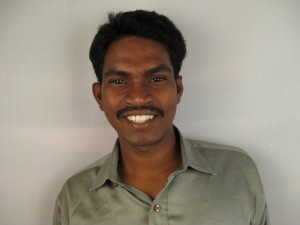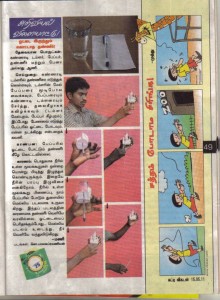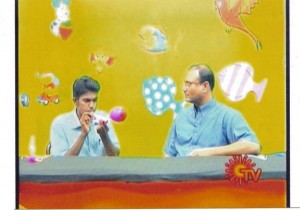 M. Mani is a dalit activist, a budding scientist, a social worker, a community journalist, a teacher, the host of a weekly live tele-quiz science on Tamizh channel Makkal TV and the IndiaUnheard Community Correspondent from Chennai. With his family, he lives in Chennai’s Nallambakkam slum which borders a very prosperous suburb. “The city of Chennai is just like the villages. The upper castes stay in the comfortable localities while the poor are forced to squat along the borders.”
M. Mani is a dalit activist, a budding scientist, a social worker, a community journalist, a teacher, the host of a weekly live tele-quiz science on Tamizh channel Makkal TV and the IndiaUnheard Community Correspondent from Chennai. With his family, he lives in Chennai’s Nallambakkam slum which borders a very prosperous suburb. “The city of Chennai is just like the villages. The upper castes stay in the comfortable localities while the poor are forced to squat along the borders.”
In addition to working with Video Volunteers, he is currently involved in a state-wide annual education survey to record and report on the literacy rates and quality of education across Tamil Nadu, as part of his work with AidIndia, where he is employed as an educational trainer. His passion for being an agent of change is such a strong part of his identity, that he even uses an alias, Makkal Sevagan, which means “The Helper of the People.” “I prefer it if people call me that.” Mani is the proud founder of ‘Guinness Science Class’ where underprivileged children are given the opportunity to study the fascinating world of science. He is currently trying to raise funds to keep his brainchild and vision afloat.
When asked about his passion for science, he replies, “I’ve been interested in it in the past nine years.” That is all he’s willing to say, at first. But what is the reason behind this passion? Where did it come from? What is it that makes him pursue and passionately advocate it?
“Do you know how many bones are there in the human body?” he asks. Not finding an answer coming his way, he offers it. “206”.
“Do you know how many bones are there in a brahmin’s body?” he then asks.
“206?”
“Do you know how many bones are there in a dalit’s body?”
“Religion traffics in dogma,” he says, “But science insists on rationality. According to science, the dalit and the brahmin are both human beings. Their bodies and systems function in the same manner. No one has the upper hand. In the eyes of science, everybody is complex, fascinating and equal.”
If science is the medium by which he makes sense of the world around him, community video and citizen journalism are the tools with which he participates in society. “I am thankful for the training, the camera, the platform and the identity of the community correspondent that Video Volunteers has given me,” he says.
 His camera is a watchdog that watches, follows and keeps tabs of the state in action. In particular, it likes the smell of policemen. “If you or I commit a mistake,” he points out, “the policemen can fine or punish us. But if a policeman commits a mistake, who punishes him? It is not like I have a personal vendetta against the police but they are essentially public servants. When they act against the public good, when they turn corrupt, when they fake a case on an innocent man, they must be checked. It is necessary to keep an eye on them so they don’t abuse their positions and powers.”
His camera is a watchdog that watches, follows and keeps tabs of the state in action. In particular, it likes the smell of policemen. “If you or I commit a mistake,” he points out, “the policemen can fine or punish us. But if a policeman commits a mistake, who punishes him? It is not like I have a personal vendetta against the police but they are essentially public servants. When they act against the public good, when they turn corrupt, when they fake a case on an innocent man, they must be checked. It is necessary to keep an eye on them so they don’t abuse their positions and powers.”
When he heard of a check point on the main road in where the policemen were openly accepting bribes from drivers not wanting to pay fines, he decided to intervene with his camera. Drawing on a previous experience when a liquor shop owner threatened to smash his camera while shooting his IndiaUnheard video on spurious liquor, Mani came up with an innovative solution where he made a small hole through a note book and hid the camera between the covers.
The footage that he captured caught showed the policemen in the various stages of accepting the bride. He immediately uploaded it on the youtube, on the Citizen Journalism venture by CCN-IBN and on his facebook page. That was when he got a call from the national news channel CNN-IBN who wanted to include him in ’50 days 50 citizens’ a special program released when the nation was in the grip of the Anna Hazare anti-corruption fever that showed ordinary citizens speaking out against corruption.
The specially shot video makes Makkal Sevagam look like the hero of the next Rajnikanth movie (Rajnikanth is a South India superstar actor and icon). “My family, friends, relatives and acquaintances... everybody loved it,” he says, “It was exciting. The crew came over with some really high tech equipment and the shoot took three days to finish. Because of my IndiaUnheard work, I was very comfortable in front of the camera. It was easy for me.”
So how did working with a mainstream media compare with working in community media with Video Volunteers?
 “I felt conflicted about it.” He explains why: “On the one hand, with CNN IBN I reached out out to the entire nation with the issues closest to my heart. On the other hand, their process is restrictive. Mainstream media insists on fitting you into their predesigned packages. The sense of community is lost. Even a sense of journalism was elusive. I felt like I was part a part of scripted show. I did not feel free to express myself. But it was a new experience and I feel glad that my work was liked and selected for the show.”
“I felt conflicted about it.” He explains why: “On the one hand, with CNN IBN I reached out out to the entire nation with the issues closest to my heart. On the other hand, their process is restrictive. Mainstream media insists on fitting you into their predesigned packages. The sense of community is lost. Even a sense of journalism was elusive. I felt like I was part a part of scripted show. I did not feel free to express myself. But it was a new experience and I feel glad that my work was liked and selected for the show.”
He values his work with IndiaUnheard because it gives him a starting point and a platform to begin a social change intervention with his community. And he learns a tremendous amount about activism and from exposures Video Volunteers offers him, like a chance to attend an upcoming BBC World Service Trust training on climate change reporting, or to speak to dozens of American traveling students with Semester at Sea. “I learn a lot at the IndiaUnheard trainings. I particularly recall the time when we were asked to think about a possible scenarios for a video focusing on gender. I found myself thinking of the transgender community who stay close my neighbourhood. I used to see them often but I had never thought about their lives and their problems and issues. When I got back home after the training, I made a video on them.”
“I was ridiculed by my friends and neighbours when they found out I was visiting and talking to the transgender community. Some even asked me not to make the video. So after I made the video, I first showed it to them. On a getting a closer look, they understood that they were wrong and that it was such petty prejudices that has relegated the transgenders to the margin.”
Dalit Rights is the central passion of his life, from which all other interests seem to branch out. One can follow his every obsession back to his dalit identity that Makkal Sevagam claims with pride. It is where the crux of his work lies.
“People all over the country are having a false notion that the condition of the dalits has radically improved. It’s shocking when some people say to me that the dalits have been emancipated and are now participating and being wholesomely represented in the mainstream. That’s a false picture.”
“The truth is that my people’s struggles are yet to be recognized. If people think that way about us it is because they are not able to communicate with us, it’s because we have absolutely no representation. The situation has to change and the media especially, community media has a major role to play if this shift has to happen. Before acting on it, society has to understand the problems that it is going through. The purpose of my life’s work is to help people see, learn, understand, face their problems and work constructively and collectively towards the solutions.”
“On a clear day, what is the colour of the sky?,” he asks.
“Blue?”
“When sunlight enters the atmosphere, there is scattering of the rays of light. On a clear day, blue is the only spectrum that can be seen by the human eye.”
For now, it seems like Mani Manickem aka Makkal Sevagan has seen the light and sized it up.
Fighting for Change: The Story of Bihar-Based Journalist Amir Abbas
Inspiration can come from many sources, but one of the most powerful is seeing someone walk the path before you. Our Community Correspondent, Syed Amir Abbas found his inspiration in Stalin K., the founding director of Video Volunteers. “I met Stalin at VV’s national meet in 2017 and I...
Video Volunteers Receives Encouraging Response To Its Buland Bol Program
Free media training course Buland Bol aims to train hundreds of people in becoming the voice of their communities.
